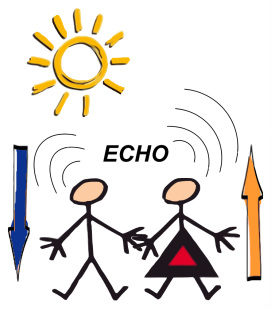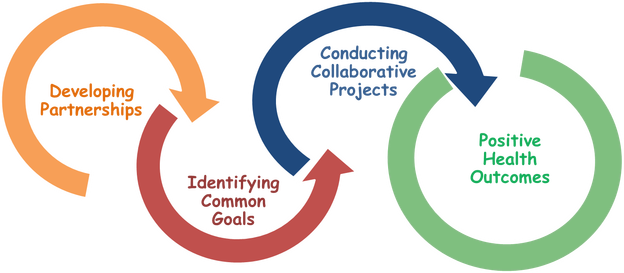What is ECHO, and Why Children's Health?

ECHO is a Research Centre dedicated to the study of health and health-related quality of life issues in children and young adults. Via our key objectives, we plan to reach our primary goal: to promote the development of children's health knowledge through research.
The ECHO Research Centre is comprised of innovative faculty at Laurentian University who share a common interest in improving the health and well-being of children through research. ECHO brings together researchers with expertise in clinical epidemiology, health geography, kinesiology, nursing, human kinetics, social work, psychology, and speech and language pathology. The ECHO Research Centre focuses on vulnerable populations including: children and youth with physical or communication disability, children in care, children and youth in rural and northern regions, aboriginal children and youth, accessibility and inclusivity of children, particularly in the school environment, and designing innovative interventions such as art-based therapy and outdoor leadership programs.
But why Children's Health?
It is well recognized that children represent the future of our society. Each generation strives to promote optimal health, education, and social development among our children. The ECHO Research Centre supports and promotes this concept through its wide array of research projects.
Members of the ECHO Research Centre define "children" as persons of 0-18 years of age. This encompasses infants, toddlers, school-aged children, and youth. A population considered to be of vulnerable status and thus, commonly excluded from research. However, because of the unique impact of growth and development, one cannot generalize from adult research to plan for the needs of children. Unique study designs are necessary to address developmental trajectories that present unique challenges to research (e.g., due to both physical and cognitive changes over time). Special attention to children's agency is now gaining attention. Furthermore, funding agencies and industry are now expecting that research will include children.
The ECHO Research Centre focuses on vulnerable populations including:
Because children are a vulnerable population, they are special issues of consent that must be considered. The wealth of experience within this research group has been recognized locally, nationally, and internationally. The basic core principle that guides child health research is that children's agency must be recognized. In research that means inclusion of the informed consent process. When the child is not cognitively able to understand the research and the risks associated with the research, parental consent is necessary in conjunction with child assent. Thus, children must always have a say in research that is about them and/or conducted with their personal involvement. Assessing health through the eyes of the children is a main objective of the ECHO Research Centre.
ECHO is a Research Centre dedicated to the study of health and health-related quality of life issues in children and young adults. Via our key objectives, we plan to reach our primary goal: to promote the development of children's health knowledge through research.
The ECHO Research Centre is comprised of innovative faculty at Laurentian University who share a common interest in improving the health and well-being of children through research. ECHO brings together researchers with expertise in clinical epidemiology, health geography, kinesiology, nursing, human kinetics, social work, psychology, and speech and language pathology. The ECHO Research Centre focuses on vulnerable populations including: children and youth with physical or communication disability, children in care, children and youth in rural and northern regions, aboriginal children and youth, accessibility and inclusivity of children, particularly in the school environment, and designing innovative interventions such as art-based therapy and outdoor leadership programs.
But why Children's Health?
It is well recognized that children represent the future of our society. Each generation strives to promote optimal health, education, and social development among our children. The ECHO Research Centre supports and promotes this concept through its wide array of research projects.
Members of the ECHO Research Centre define "children" as persons of 0-18 years of age. This encompasses infants, toddlers, school-aged children, and youth. A population considered to be of vulnerable status and thus, commonly excluded from research. However, because of the unique impact of growth and development, one cannot generalize from adult research to plan for the needs of children. Unique study designs are necessary to address developmental trajectories that present unique challenges to research (e.g., due to both physical and cognitive changes over time). Special attention to children's agency is now gaining attention. Furthermore, funding agencies and industry are now expecting that research will include children.
The ECHO Research Centre focuses on vulnerable populations including:
- Children and youth with physical or communication disabilities
- Children in care
- Children and youth in rural and northern regions
- Indigenous children and youth
- Accessibility and inclusivity of children, particularly in the school environment
- Design and effectiveness of innovative intervention programs including arts-based therapy and outdoor adventure leadership programs
Because children are a vulnerable population, they are special issues of consent that must be considered. The wealth of experience within this research group has been recognized locally, nationally, and internationally. The basic core principle that guides child health research is that children's agency must be recognized. In research that means inclusion of the informed consent process. When the child is not cognitively able to understand the research and the risks associated with the research, parental consent is necessary in conjunction with child assent. Thus, children must always have a say in research that is about them and/or conducted with their personal involvement. Assessing health through the eyes of the children is a main objective of the ECHO Research Centre.


